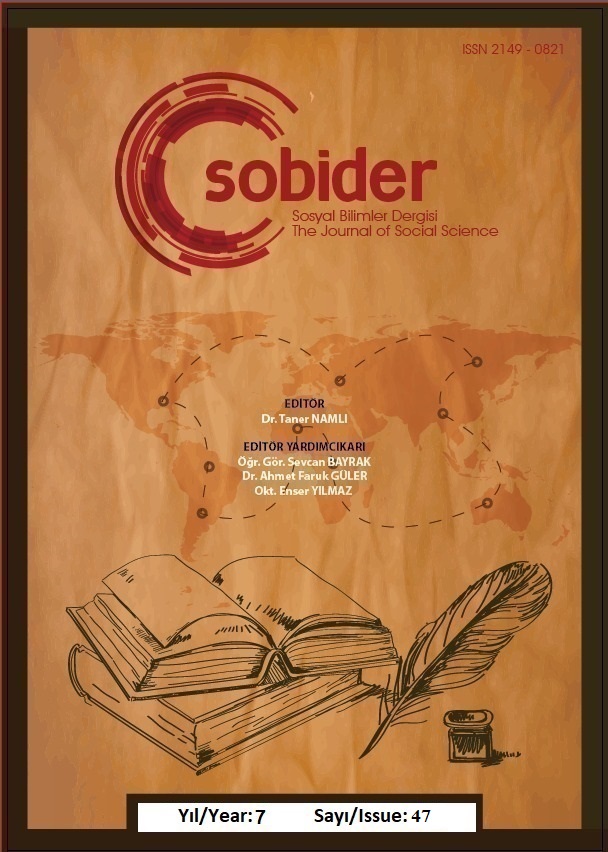Author :
Abstract
Dikkat eksikliği ve hiperaktivite bozukluğu (DEHB) genellikle ilk çocukluk yıllarında başlayan ve ergenlikte devam eden; aktiviteleri düzenleme, dürtüleri kontrol etme ve dikkati sürdürmede ortaya çıkan gelişimsel ve tedavi edilmesi gereken bir bozukluktur. Hiperaktivite kavramının halk arasındaki kullanımı son yıllarda oldukça yaygınlaşmakta ve kavramın, bilimsel anlamından farklı olarak “yaramaz”, “şımarık” vb. bireyleri tanımlamak için de kullanıldığı görülmektedir. “Hiperaktif” kavramı ile ilgili olarak insanların zihninde, genel olarak tanı kriterlerinden en gözlemlenebilir özellik ile bağdaşan bir sosyal temsilin oluştuğunu görebiliriz. Sosyal psikolog Serge Moscovici’nin birey ve toplumu sosyal alanda buluşturan bir model bağlamında ortaya koyduğu sosyal temsiller teorisine göre bilgi insanların anlamlandırması ile inşa edilir ve insanlar zihinlerine yerleştirdikleri sosyal temsilin gerçek anlamı üzerine düşünmezler. Bunda iletişimin de rolü oldukça büyüktür. Bu çalışma “hiperaktif” kavramının toplumdaki sosyal temsillerini ortaya koyarak, hiperaktivite kavramının bilimsel anlamıyla yaygınlaşmasına katkı sağlamayı amaçlamaktadır.
Keywords
Abstract
Attention deficit and hyperactivity disorder (ADHD) is a developmental disorder that needs to be treated, which tends to start in early childhood and continues during adolescence, arising in regulating activities, controlling impulses and maintaining attention. The use of the concept of hyperactivity among the public has become widespread in recent years and it is seen that this concept is also used to identify “naugthy” or “spoiled” individuals unlike its scientific meaning. As we see in the study results, a social representation which matches up with the most observable diagnosis criteria of “hyperactive” is occured in the minds of the people. According to the social representation theory put forward by social psychologist Serge Moscovici in the context of a model that brings the individual and society together in the social field, knowledge is built through people’s interpretation of topics and people do not think on the true meaning of the social representation they place in their minds. Communication plays a major role in this. This study aims to contribute to the widespread use of the concept of hyperactivity in its scientific sense by revealing the social representations of the concept of “hyperactive” in society.
Keywords
- Akgün, G. M., Tufan, A. E., Yurteri, N. & Erdoğan, A. (2011). “Dikkat Eksikliği Hiperaktivite Bozukluğunun Genetik Boyutu”, Psikiyatride Güncel Yaklaşımlar, 3(1): 15-48.
- APB, (2013). Amerikan psikiyatri birliği, mental bozuklukların tanısal ve sayımsal el kitabı (DSM 5) (Çev. Ed. E. Köroğlu). Ankara: Hekimler Yayın Birliği, 2014.
- Arkonaç, S. (2016). İnsan İnsan İçinde, İstanbul: Hiperlink.
- Bulut, M. (2008). “Bir Sosyal Temsil Araştırması: Medyada ve Üniversite Öğrencilerinde “Töre”nin Algılanışı”, Ç.Ü. Sosyal Bilimler Enstitüsü Dergisi, 17(3): 63-78.
- Ceylan, S., Doğulu , C. & Akbaş, G. (2016). "Namus Adına Kadına Yönelik Şiddete Dair Sosyal Temsiller: Karma Yöntemli Bir Çalışma", Türk Psikoloji Yazıları, (19): 50-60.
- Cirhinlioğlu, F. G., Aktaş, V. & Öner Özkan, B. (2006). "Sosyal Temsil Kuramına Genel Bir Bakış", C.Ü. Sosyal Bilimler Dergisi, 30(2): 163-174.
- Çetin, M. & Eşiyok Sönmez, E. (2014). "Sosyal Temsil Kuramı Bağlamında Kuramsal Reklamlar: Türk Hava Yolları Örneği", İletişim Kuram ve Araştırma Dergisi, 39: 191207.
- Faiz, S. (2018). Türkiye'de Reklamcı Temsili; Televizyon Dizileri Üzerine Bir Araştırma, Yüksek Lisans Tezi, Ankara: Başkent Üniversitesi Sosyal Bilimler Enstitüsü.
- Günay, Ş., Savran, C. & Aksoy, U. M. (2005). “Erişkin Dikkat Eksikliği Hiperaktivite Ölçeğinin Dilsel Eşdeğerlilik, Geçerlik Güvenirlik ve Norm Çalışması”, M.Ü. Atatürk Eğitim Fakültesi Eğitim Bilimleri Dergisi, 21(21): 133-150.
- Jovchelovitch, S. (2008). "The rehabilitation of common sense: Social representations, science and cognitive polyphasia", Journal for the Theory of Social Behaviour, 38(4): 431-448.
- Kayaalp, L. (2008) “Dikkat Eksikliği Hiperaktivite Bozukluğu”, İ.Ü. Cerrahpaşa Tıp Fakültesi Sürekli Tıp Eğitimi Etkinlikleri Sempozyum Dizisi 62-Türkiye’de Sık Karşılaşılan Psikiyatrik Hastalıklar, 6-7 Mart 2008, İstanbul.
- Kiriş, N. & Karakaş, S. (2004). “Dikkat eksikliği hiperaktivite bozukluğunun zekâ testlerinden ve ilgili diğer nöropsikolojik araçlardan yordanabilirliği”, Klinik Psikiyatri Dergisi, 7(3): 139-152.
- Kring A., Johnson S. L., Davidson G. & Neale J. (2017). Anormal Psikolojisi, 12. Basımdan Çeviri, (Çev.Ed.) Şahin, M., Ankara: Nobel Akademik Yayıncılık.
- Menkü, M. U. (2006). Kalite Algısının Sosyal Temsilleri, Yüksek Lisans Tezi, İstanbul: İstanbul Üniversitesi Sosyal Bilimler Enstitüsü.
- Minibaş-Poussard, J., Erkmen, T. & Karsak, B. (2011). "Kadın Yöneticilere İlişkin Sosyal Temsiller: Bankacılık Sektörüne Yönelik Bir İnceleme", Galatasaray Üniversitesi İletişim Dergisi, 15(15): 45-58.
- Moscovici, S. (1981). On Social Representations. In Joseph Forgas (Ed.), Social cognition: perspectives on everyday understanding (pp. 181-210). New York: Academic Press.
- Moscovici, S. (1984). The Phenomenon of Social Representations. In R. M. Farr & S. Moscovici, (Eds), Social representations (pp. 3-69). Cambridge: Cambridge Press.
- Moscovici, S. (2000). Social Representations: Explorations in social psychology, Cambridge: Polity Press.
- Narter, M. (2003). "Deliliğin Sosyal Temsilleri", İstanbul Üniversitesi Sosyoloji Dergisi, 3(7): 23-70.
- Öner, B. (2002). "Sosyal Temsiller", Kriz Dergisi, 10(1): 29-35.
- Şah, U. (2011a). "Transseksüelliğin Sosyal Temsilleri", Kaos Gl Dergi, 118: 50-52.
- Şah, U. (2011b). "Türkiye'deki Gençlerin Cinsel Yönelimlere İlişkin Sosyal Temsilleri", Türk Psikoloji Yazıları, 14(27): 88-99.
- Şahsuvaroğlu, T. & Ekşi, H. (2008). "Odak Grup Görüşmeleri Ve Sosyal Temsiller Kuramı", Eğitim Bilimleri Dergisi, 28(28): 127-139.
- Şenol, S., İşeri, E. & Koçkar, A. İ. (2006). Dikkat eksikliği hiperaktivite bozukluğu, Ankara: HYB Yayıncılık.
- Tınaz, D. (2004). “Ergen Ve Yetişkinde ADHD-Dikkat Eksikliği Ve Hiperaktivite Bozukluğu”, Hasan Ali Yücel Eğitim Fakültesi Dergisi, 1(1): 195-206.
- Üzelgün, M. A. (2015). "Sosyal Temsil Çalışmaları İçin Sistematik Bir Yöntem Olarak Argüman Analizi". Psikoloji Çalışmaları Dergisi, 71-90.
- Yener, S. (2017). “Dikkat Eksikliği-Hiperaktivite Bozukluğu Yaratıcılığı Tetikler Mi? Psikolojik İklimin Aracı Rolü”, Sinop Üniversitesi Sosyal Bilimler Dergisi, 1(2): 115148.





